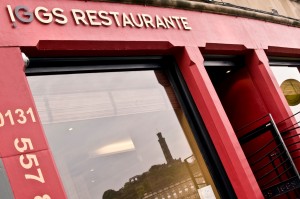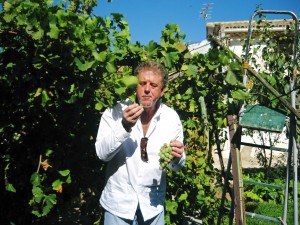 ][1]
][1]Originally from Teruel in Spain, Iggy Campos is one of Edinburgh’s most long serving restaurateurs. He opened Iggs Spanish restaurant on Jeffrey Street in 1989 and added Barioja, a tapas bar, in 2001. Over the course of a career spanning forty years, Iggy has worked everywhere from the nightclubs of Benidorm to Dundee’s debut Spanish restaurant. He first worked in Britain in the late Seventies when the country’s restaurant culture was not as pervasive as it is today and there was a fair chance that customers might try to drink the contents of a fingerbowl.
What were your first impressions of British restaurants?
IC: I worked in the British Transport hotels and they all had the same menu which was set by head office. Chefs had a very low profile in those days. There just wasn’t as much choice as there is now. As I remember it, there were only ever four soups: French onion soup, Cullen skink, Scotch broth or lentil. Main courses tended to be garnished steaks or haddock with chips and peas. Dessert was Black Forest gateau or trifle made with skoosh cream. People would eat a half grapefruit with brown sugar as a starter.
 ][3]
][3]What was the first restaurant you owned?
IC: I opened a place called Don Quixote in Dundee in the early Eighties. It was 100% Spanish and I’m pretty sure that it was only the second Spanish restaurant to open in all of Scotland. I bought all the tiles, the chairs, tables, crockery and so on over from Spain in a van. The tiles came from my grandfather’s roof.
What difficulties did you face?
IC: Getting hold of wine then was a nightmare. There was only one wine supplier up here who stocked Rioja. Everything else had to come up from London, Liverpool or Manchester. It took me ages to produce a wine list with all Spanish wines.
I remember when we started serving prawns with the heads on, people just hadn’t seen it before. They were used to scampi or prawn cocktails where the prawns were already shelled. In the early days, an elderly couple came in and ordered the prawns cooked with garlic and chilli. Because we served them with their heads on, we put finger bowls on the table and the couple drank them.
We didn’t say anything because we thought it would be embarrassing but, at the end of the meal, I asked how it all was and the guy said, ‘Yes, it was lovely. Thank you but don’t you use spoons for soup in Spain?’
Had the situation improved by the time you opened Iggs?
IC: Yes it had. We’ve been going twenty years now but the tapas concept was a hard thing to get over at first. People couldn’t quite get the idea of having several tapas rather than a starter and main course. Today it’s different. Spain has been fashionable for a few years now and the public know a lot more. They know that the wine is called Rioja and not Riodger.
The British have been taking holidays in Spain for decades. They must have had some idea about Spanish food?
IC: Spanish restaurateurs tried to serve them Spanish food but holiday makers wanted their full cooked breakfasts. Restaurateurs just met that that demand. I worked in Benidorm in the Seventies. Restaurateurs couldn’t sell paella but they had to import baked beans because that’s what people wanted.
Now everyone knows about tapas and also Spanish produce is much better known. Nowadays customers know we do great ham or chorizo. Fifteen years ago, nobody knew what chorizo was. Now, every menu has chorizo on it somewhere.
Does it annoy you that tapas has, in a sense, been hijacked and that tapas is no longer limited to Spanish restaurants?
IC: No, it’s just evolution. Every carryout does pizza but they aren’t all Italians. Things become popular so people copy them. You can’t stop it. What does annoy me is when people try a copy of a Spanish dish and then tell me that it’s better than the original authentic dish. It’s not better, it’s different and it’s not the real thing. It’s an imitation. It’s like the difference between a haggis made in Scotland and one made in England. That doesn’t mean that the English one is no good but it’s not genuine.
You switched from cooking to front of house. Do you miss the kitchen?
IC: Yes, I miss it. Once you are a chef, you are always a chef but I had to come out of the kitchen for my family life. I didn’t want to come out. I’m happy being front of house but I prefer cooking. I like the creativity of being a chef, the excitement of thinking ‘What will I cook today?’ When I wake up, the first thing I think about is food. What am I going to eat today is my first thought.
How do you feel about celebrity chefs?
IC: I think that television can make chefs’ careers go from zero to sixty but some lost the passion for food that they once had. They start cooking and then want to go on television and decide that they have to be funny or rude to do that. The best chefs in the world haven’t been on the telly and they don’t want to be either. That doesn’t mean that the ones on the telly are no good but the being on the telly has taken over the passion for food.
Where do you like to eat out?
IC: Us chefs can be difficult. If I eat out and enjoy my food then I get annoyed because someone is doing something better than me. I go to new places to see what they are doing in terms of the decor and the cooking. There are lots of good restaurants in the UK now compared to twenty years ago when there was a lot of crap. The restaurants are better and better. I quite often go to an Indian and I always ask for the same thing: chicken tandoori, naan and some spinach, potato and chickpeas.
What do you cook for yourself?
IC: I like cooking at home and sometimes do quite elaborate dishes but I’m just as happy with fried egg and chips some times. When you are working with food all day and trying everything then you want to stay away from all that when you eat yourself. You want simplicity: an omelette or egg and chips. When I was working in the kitchens, I would sometimes just have cornflakes. I was hungry but couldn’t beat the thought of cooking meat or fish.
What is changing now in the restaurant trade?
IC: The lunch trade is down and I don’t think it will come back to what it was previously. People don’t do deals over lunch anymore. The internet has done away with much of the need to meet face to face.
In general, people still go out and spend money but, rather than going to a restaurant and having a drink, wine with the meal and then coffee and liqueurs, they go for a cocktail somewhere first then eat and have wine and then go on elsewhere for more drinks. People want to see as many places as possible in one night.
